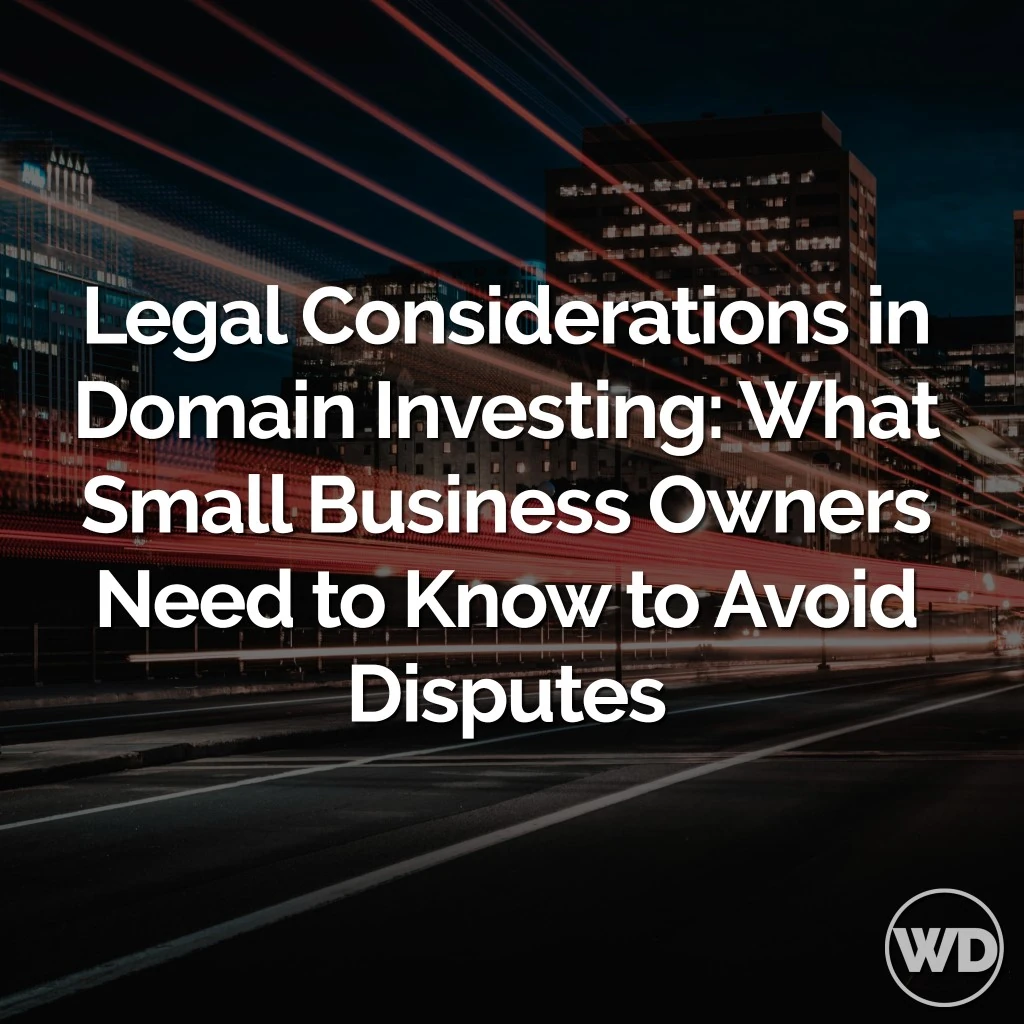Domain investing can be a rewarding venture for small business owners, whether you’re looking to flip domain names for a profit, build your brand, or protect your business’s digital presence. However, the world of domain investing isn’t just about buying and selling. There are legal considerations you should be aware of to avoid potential disputes, protect your investments, and stay on the right side of the law. In this guide, we’ll walk through the major legal aspects of domain investing, from trademarks and copyright issues to protecting your own domains.
Understanding Trademarks: The Foundation of Domain Name Rights
One of the biggest legal challenges in domain investing is dealing with trademarks. When you buy a domain that’s similar to a trademarked brand, you could face serious legal consequences, including losing the domain name or paying damages.
What is a Trademark?
A trademark is a word, phrase, symbol, or design that identifies and distinguishes the source of goods or services. For example, Coca-Cola is trademarked, meaning only Coca-Cola can legally use that name for soft drinks and beverages.
Why Trademarks Matter in Domain Investing
If you buy a domain that’s similar to a well-known trademark (e.g., “NikeShoesOnline.com”), the trademark holder could claim trademark infringement and file a complaint. This could result in losing your domain or even facing fines. Small business owners should check for trademarks before purchasing a domain to avoid costly disputes.
How to Check for Trademarks
You can check for registered trademarks by using the USPTO’s (United States Patent and Trademark Office) trademark search tool or similar trademark databases in your country. Look for any registered marks that resemble your domain idea.
Or use a paid service to conduct your trademark search: LegalZoom (Avoid costly trademark conflicts before you apply)
The Risks of Cybersquatting: What Not to Do
Cybersquatting is when someone buys a domain similar to a well-known brand with the intention of profiting by reselling it at a high price. It’s a common issue in domain investing and one that can land you in legal trouble.
Examples of Cybersquatting
- Buying a domain like “AmazonPrimeDeals.com” in the hope of selling it to Amazon.
- Registering multiple domains that closely resemble a popular brand name, with plans to resell them.
Cybersquatting is illegal in many countries. In the U.S., for example, the Anticybersquatting Consumer Protection Act (ACPA) prohibits this practice. If you’re found guilty of cybersquatting, you could lose the domain and even pay hefty fines.
How to Avoid Cybersquatting Claims
When investing in domains, avoid names that clearly mimic or play off of established brands. Aim for original, brandable names that don’t rely on others’ trademarks. If in doubt, consult with a trademark attorney to make sure you’re on safe ground.
The Uniform Domain-Name Dispute-Resolution Policy (UDRP): A Domain Investor’s Guide
The Uniform Domain-Name Dispute-Resolution Policy (UDRP) is an international process for resolving disputes over domain names, particularly those involving trademark infringement.
What is the UDRP?
The UDRP provides a way for trademark owners to file complaints about domain names they believe infringe on their trademarks. If they win, the disputed domain is transferred to them, often without the need for a court case.
How the UDRP Impacts Domain Investors
If you purchase a domain similar to a trademarked name, the trademark owner can file a UDRP complaint against you. If you’re found to have no legitimate interest in the domain and are using it in “bad faith,” you may lose the domain.
Protecting Yourself from UDRP Claims
To avoid UDRP disputes, invest in domains that are unique and not confusingly similar to established brands. Additionally, having a legitimate business purpose for your domain (e.g., using it for a blog or small business website) can help protect against claims of bad faith.
Domain Parking and Legal Implications
Domain parking is a common strategy in domain investing where you register a domain but don’t develop a website. Instead, you “park” it with ads or a holding page to make some income or hold it until you’re ready to sell.
Legal Issues with Domain Parking
While domain parking is legal, there are potential risks if your parked page features ads that are too similar to the content of a trademarked brand. For example, parking a domain like “NikeRunningShoes.com” with ads for athletic gear could create the impression that it’s associated with Nike, leading to trademark infringement claims.
Best Practices for Domain Parking
To avoid legal issues:
- Ensure your parked page doesn’t suggest an affiliation with a specific brand.
- Avoid placing ads that could confuse visitors into thinking the site is official or endorsed by a trademark holder.
Reselling Domains: Legal Considerations for Flipping Domains
Domain flipping—buying and reselling domains for profit—is a common goal in domain investing. However, it’s essential to understand the legal considerations involved in reselling.
Ensuring a Clean Domain History
Before reselling, check the domain’s history to make sure it wasn’t used for illegal activities or spam, as this could affect its SEO ranking and reputation. Tools like Wayback Machine and Ahrefs can help reveal a domain’s history.
Avoiding Deceptive Marketing Tactics
When listing a domain for sale, make sure not to imply false associations or endorsements. For example, claiming that a domain is “endorsed by” or “related to” a big brand can lead to false advertising claims.
Know Your Buyer’s Intentions
While you don’t have control over how a buyer uses a domain after purchasing it, selling a domain that was clearly registered to target a brand could expose you to legal issues, especially if you intentionally marketed it as such.
Copyright Considerations: Content on Domains
If you buy an “aged domain” that previously had a website, it may still have content that’s copyrighted by the original owner. Using or republishing any copyrighted content without permission can lead to legal issues.
Best Practices for Content Use on Aged Domains
- Wipe Old Content: When you acquire a domain, ensure any old content is removed or replaced with original material.
- Check for Backlinks: Verify that old links pointing to the domain aren’t associated with copyrighted material, as this can affect your reputation and SEO.
Legal Safeguards for Protecting Your Own Domains
In addition to avoiding legal risks, you should also take steps to protect your own domains from potential disputes.
Register Trademarks for Your Brand and Domain
If you’re serious about building a brand, consider registering your brand’s name as a trademark. This will protect your domain name from being used by competitors and give you a stronger case if anyone tries to infringe on your brand.
Keep Records of Domain Purchases and Sales
Having documentation of your domain purchases and sales can be valuable in case of a legal dispute. Save invoices, receipts, and any email correspondence to prove ownership and transaction details.
Use WHOIS Privacy for Personal Protection
Consider using WHOIS Privacy Protection to keep your personal information secure and avoid spam or harassment. However, note that some legal claims, like UDRP complaints, may still require revealing your identity.
When to Consult a Domain Attorney
While many aspects of domain investing can be handled independently, certain legal issues may require the guidance of an experienced domain attorney. If you’re facing a UDRP complaint, dealing with a trademark infringement claim, or navigating complex domain deals, an attorney can provide valuable advice.
Final Thoughts: Staying Smart and Safe in Domain Investing
For small business owners, domain investing can open up new revenue streams and help protect your brand’s online presence. However, the legal landscape surrounding domain names is complex. By being aware of potential legal pitfalls—like trademarks, cybersquatting, and UDRP disputes—you can make smarter investments and avoid costly mistakes.
Remember, when in doubt, it’s always worth consulting a legal professional to ensure you’re making informed decisions and staying compliant. With the right approach, domain investing can be a rewarding and safe way to grow your business or portfolio.
This article provides a detailed, user-friendly guide for small business owners interested in domain investing while covering legal considerations to avoid potential disputes.





